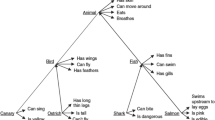Abstract
Readers with autism (ASD), poor comprehension (PC), and typical development (TD) took part in three reading experiments requiring the production of inferences. In Experiments 1 and 2 reading times for target phrases—placed immediately after text implicitly indicating the emotion of a protagonist or after a number of filler sentences, respectively—were used as measures of inferencing. In Experiment 3, participants were explicitly asked to identify the protagonist’s emotion. There were no significant differences among groups in Experiment 1. Compared to TD readers, the PC group performed poorly in Experiments 2 and 3. ASD readers performed worse than PC participants only in the explicit-question task. Although ASD readers can produce inferences, they respond to questions about them with difficulty.



Similar content being viewed by others
References
Ackerman, B. P. (1984a). Storage and processing constraints on integrating story information in children and adults. Journal of Experimental Child Psychology, 38, 64–92. doi:10.1016/0022-0965(84)90019-5.
Ackerman, B. P. (1984b). The effects of storage and processing complexity on comprehension repair in children and adults. Journal of Experimental Child Psychology, 37, 303–334. doi:10.1016/0022-0965(84)90007-9.
Baron-Cohen, S., Hoekstra, R. A., Knickmeyer, R., & Wheelwright, S. (2006). The autism-spectrum quotient (AQ)–adolescent version. Journal of Autism and Developmental Disorders, 36, 343–350. doi:10.1007/s10803-006-0073-6.
Baron-Cohen, S., Wheelwright, S., Hill, J., Raste, Y., & Plumb, I. (2001). The “reading the mind in the eyes” test revised version: A study with normal adults, and adults with Asperger syndrome or high-functioning autism. Journal of Child Psychology and Psychiatry and Allied Disciplines, 42, 241–251. doi:10.1017/S0021963001006643.
Bodner, K. E., Engelhardt, C. R., Minshew, N. J., & Williams, D. L. (2015). Making inferences: Comprehension of physical causality, intentionality, and emotions in discourse by high-functioning older children, adolescents, and adults with autism. Journal of Autism and Developmental Disorders,. doi:10.1007/s10803-015-2436-3.
Brock, J., & Bzishvili, S. (2013). Deconstructing frith and snowling’s homograph-reading task: Implications for autism spectrum disorders. The Quarterly Journal of Experimental Psychology, 66, 1764–1773. doi:10.1080/17470218.2013.766221.
Brock, J., Norbury, C., Einav, S., & Nation, K. (2008). Do individuals with autism process words in context? Evidence from language-mediated eye-movements. Cognition, 108, 896–904. doi:10.1016/j.cognition.2008.06.007.
Brown, H. M., Oram-Cardy, J., & Johnson, A. (2013). A meta-analysis of the reading comprehension skills of individuals on the autism spectrum. Journal of Autism and Developmental Disorders, 43, 932–955. doi:10.1007/s10803-012-1638-1.
Cain, K. (2006). Individual differences in children’s memory and reading comprehension: An investigation of semantic and inhibitory deficits. Memory, 14, 553–569. doi:10.1080/09658210600624481.
Cain, K., & Oakhill, J. V. (1999). Inference making ability and its relation to comprehension failure in young children. Reading and Writing, 11, 489–503. doi:10.1023/A:1008084120205.
Cain, K., Oakhill, J. V., & Elbro, C. (2003). The ability to learn new word meanings from context by school-age children with and without language comprehension difficulties. Journal of Child Language, 30, 681–694. doi:10.1017/S0305000903005713.
Cain, K., Oakhill, J. V., & Lemmon, K. (2004). Individual differences in the inference of word meanings from context: The influence of reading comprehension, vocabulary knowledge, and memory capacity. Journal of Educational Psychology, 96, 671–681. doi:10.1037/0022-0663.96.4.671.
Calleja, M., Rodríguez-Santos, J. M., Torres, S., & García-Orza, J. (2009). La generación de inferencias causales de naturaleza emocional en sujetos con alto y bajo nivel lector [production of causal inferences of an emotional nature in good and poor readers]. Infancia y Aprendizaje, 32, 583–586.
Castles, A., Crichton, A., & Prior, M. (2010). Developmental dissociations between lexical reading and comprehension: Evidence from two cases of hyperlexia. Cortex: A Journal Devoted to the Study of the Nervous System and Behavior, 46, 1238–1247. doi:10.1016/j.cortex.2010.06.016.
Chiang, H. M., & Lin, Y. H. (2007). Reading comprehension instruction for students with autism spectrum disorders a review of the literature. Focus on Autism and Other Developmental Disabilities, 22, 259–267. doi:10.1177/10883576070220040801.
Cornoldi, C., & Oakhill, J. V. (1996). Reading comprehension difficulties: Processes and intervention. New York, NY: Routledge.
Davies, R., Cuetos, F., & González-Seijas, R. M. (2007). Reading development and dyslexia in a transparent orthography: A survey of Spanish children. Annals of Dyslexia, 57, 179–198. doi:10.1007/s11881-007-0010-1.
De Vega, M., León, I., & Díaz, J. M. (1996). The representation of changing emotions in reading comprehension. Cognition and Emotion, 10, 303. doi:10.1080/026999396380268.
Flores, M. M., & Ganz, J. B. (2009). Effects of direct instruction on the reading comprehension of students with autism and developmental disabilities. Education and Training in Developmental Disabilities, 44(1), 39–53.
Foley-Nicpon, M., Assouline, S. G., & Stinson, R. D. (2012). Cognitive and academic distinctions between gifted students with autism and Asperger syndrome. Gifted Child Quarterly, 56, 77–89. doi:10.1177/0016986211433199.
Frith, U., & Snowling, M. (1983). Reading for meaning and reading for sound in autistic and dyslexic children. British Journal of Developmental Psychology, 1, 329–342. doi:10.1111/j.2044-835X.1983.tb00906.x.
Gernsbacher, M. A., Goldsmith, H. H., & Robertson, R. (1992). Do readers mentally represent characters’ emotional states? Cognition and Emotion, 6, 89–111. doi:10.1080/02699939208411061.
Gygax, P., Garnham, A., & Oakhill, J. (2004). Inferring characters’ emotional states: Can readers infer specific emotions? Language and Cognitive Processes, 19, 613–639. doi:10.1080/01690960444000016.
Happé, F. (1997). Central coherence and theory of mind in autism: Reading homographs in context. British Journal of Developmental Psychology, 15(1), 1–12. doi:10.1111/j.2044-835X.1997.tb00721.x.
Huemer, S. V., & Mann, V. (2010). A comprehensive profile of decoding and comprehension in autism spectrum disorders. Journal of Autism and Developmental Disorders, 40, 485–493. doi:10.1007/s10803-009-0892-3.
Hulme, C., & Snowling, M. (2011). Children’s reading comprehension difficulties nature, causes, and treatments. Current Directions in Psychological Science, 20, 139–142. doi:10.1177/0963721411408673.
Jolliffe, T., & Baron-Cohen, S. (1999a). A test of central coherence theory: Linguistic processing in high-functioning adults with autism or Asperger syndrome: Is local coherence impaired? Cognition, 71, 149–185. doi:10.1016/S0010-0277(99)00022-0.
Jolliffe, T., & Baron-Cohen, S. (1999b). The strange stories test: A replication with high-functioning adults with autism or Asperger syndrome. Journal of Autism and Developmental Disorders, 29, 395–406. doi:10.1023/A:1023082928366.
Jolliffe, T., & Baron-Cohen, S. (2000). Linguistic processing in high-functioning adults with autism or Asperger’s syndrome: Is global coherence impaired? Psychological Medicine, 30, 1169–1187. doi:10.1017/S003329179900241X.
Jones, C. R. G., Happé, F., Golden, H., Marsden, A. J. S., Tregay, J., Simonoff, E., & Charman, T. (2009). Reading and arithmetic in adolescents with autism spectrum disorders: Peaks and dips in attainment. Neuropsychology, 23, 718–728. doi:10.1037/a0016360.
Lucas, R., & Norbury, C. (2015). Making inferences from text: It’s vocabulary that matters. Journal of Speech, Language, and Hearing Research,. doi:10.1044/2015_JSLHR-L-14-0330.
Mayes, S. D., & Calhoun, S. L. (2008). WISC-IV and WIAT-II profiles in children with high-functioning autism. Journal of Autism and Developmental Disorders, 38, 428–439. doi:10.1007/s10803-007-0410-4.
Myles, B. S., Hilgenfeld, T. D., Barnhill, G. P., Griswold, D. E., Hagiwara, T., & Simpson, R. L. (2002). Analysis of reading skills in individuals with Asperger syndrome. Focus on Autism and Other Developmental Disabilities, 17(1), 44–47. doi:10.1177/108835760201700104.
Nash, H., & Heath, J. (2011). The role of vocabulary, working memory and inference making ability in reading comprehension in down syndrome. Research in Developmental Disabilities, 32, 1782–1791. doi:10.1016/j.ridd.2011.03.007.
Nation, K. (2005). Children’s reading comprehension difficulties. In M. Snowling & C. Hulme (Eds.), The science of reading: A handbook (1st ed., pp. 248–265). Oxford: Blackwell.
Nation, K., Cocksey, J., Taylor, J. S. H., & Bishop, D. V. M. (2010). A longitudinal investigation of early reading and language skills in children with poor reading comprehension. Journal of Child Psychology and Psychiatry and Allied Disciplines, 51, 1031–1039. doi:10.1111/j.1469-7610.2010.02254.x.
Nation, K., Marshall, C. M., & Altmann, G. T. M. (2003). Investigating individual differences in children’s real-time sentence comprehension using language-mediated eye movements. Journal of Experimental Child Psychology, 86, 314–329. doi:10.1016/j.jecp.2003.09.001.
Norbury, C., & Bishop, D. V. M. (2002). Inferential processing and story recall in children with communication problems: A comparison of specific language impairment, pragmatic language impairment and high-functioning autism. International Journal of Language & Communication Disorders, 37, 227–251. doi:10.1080/13682820210136269.
Norbury, C., & Nation, K. (2011). Understanding variability in reading comprehension in adolescents with autism spectrum disorders: Interactions with language status and decoding skill. Scientific Studies of Reading, 15, 191–210. doi:10.1080/10888431003623553.
Oakhill, J., Hartt, J., & Samols, D. (2005). Levels of comprehension monitoring and working memory in good and poor comprehenders. Reading and Writing: An Interdisciplinary Journal, 18, 657–686.
Oliphant, G. W. (1983). Repetition and recency effects in word recognition. Australian Journal of Psychology, 35, 393–403. doi:10.1080/00049538308258751.
Ricketts, J., Jones, C. R. G., Happé, F., & Charman, T. (2013). Reading comprehension in autism spectrum disorders: The role of oral language and social functioning. Journal of Autism and Developmental Disorders, 43, 807–816. doi:10.1007/s10803-012-1619-4.
Saldaña, D., & Frith, U. (2007). Do readers with autism make bridging inferences from world knowledge? Journal of Experimental Child Psychology, 96, 310–319. doi:10.1016/j.jecp.2006.11.002.
Sansosti, F. J., Was, C., Rawson, K. A., & Remaklus, B. L. (2013). Eye movements during processing of text requiring bridging inferences in adolescents with higher functioning autism spectrum disorders: A preliminary investigation. Research in Autism Spectrum Disorders, 7, 1535–1542. doi:10.1016/j.rasd.2013.09.001.
Schneider, W., Eschman, A., & Zuccolotto, A. (2007). E-Prime program. (Versión 2.0). Pittsburgh: Psychology Software Tools Inc.
Schoot, M., Reijntjes, A., & Lieshout, E. C. D. M. (2012). How do children deal with inconsistencies in text? An eye fixation and self-paced reading study in good and poor reading comprehenders. Reading and Writing, 25, 1665–1690. doi:10.1007/s11145-011-9337-4.
Serrano, F., & Defior, S. (2005). Dyslexia in Spanish: The state of the matter. Electronic Journal of Research in Educational Psychology, 2, 13–34.
Singer, M., & Halldorson, M. (1996). Constructing and validating motive bridging inferences. Cognitive Psychology, 30, 1–38. doi:10.1006/cogp.1996.0001.
Snowling, M., & Frith, U. (1986). Comprehension in “hyperlexic” readers. Journal of Experimental Child Psychology, 42, 392–415. doi:10.1016/0022-0965(86)90033-0.
St Clair, M. C., Durkin, K., Conti-Ramsden, G., & Pickles, A. (2010). Growth of reading skills in children with a history of specific language impairment: The role of autistic symptomatology and language-related abilities. The British Journal of Developmental Psychology, 28(Pt 1), 109–131.
Toro, J., Cervera, M., & Urio, C. (2002). EMLE: Escalas Magallanes De Lectura Y Escritura: TALE-2000 [Magellan scales for reading and writing]. Madrid: Grupo ALBOR-COHS.
Uljarevic, M., & Hamilton, A. (2013). Recognition of emotions in autism: A formal meta-analysis. Journal of Autism and Developmental Disorders, 43, 1517–1526. doi:10.1007/s10803-012-1695-5.
Wechsler, D. (2002). WAIS-III: Escala De Inteligencia De Wechsler Para Adultos-III. Madrid: TEA.
Wechsler, D. (2005). WISC-IV: Escala De Inteligencia De Wechsler Para Niños IV. Madrid: TEA.
Yuill, N., & Oakhill, J. V. (1988). Understanding of anaphoric relations in skilled and less skilled comprehenders. British Journal of Psychology, 79, 173–186. doi:10.1111/j.2044-8295.1988.tb02282.x.
Yuill, N., Oakhill, J. V., & Parkin, A. (1989). Working memory, comprehension ability and the resolution of text anomaly. British Journal of Psychology, 80, 351–361. doi:10.1111/j.2044-8295.1989.tb02325.x.
Zabrucky, K., & Ratner, H. H. (1986). Children’s comprehension monitoring and recall of inconsistent stories. Child Development, 57, 1401–1418. doi:10.2307/1130419.
Acknowledgments
This study was conducted thanks to the funding received from the University of Seville (IV and V Plan Propio) to the first author and the Spanish Ministerio de Economía y Competitividad (Grants Number PSI2010-7401 and Number CONSOLIDER INGENIO 2010 CSD2008–00048) to the second. The authors wish to thank all the teachers, pupils, and educational authorities that participated in the study for their collaboration, as well as Inmaculada González, M. Ángeles Solís, and Gabriel Mesa for their assistance in collecting the data and parent support groups Autismo Sevilla and Asperger Andalucía. The advice of Gina Conti-Ramsden and Mila Vulchanova to the first author was of great assistance during the phases of design and data analysis.
Author Contributions
The experiments described in this paper were part of María J. Tirado's PhD Dissertation. David Saldaña was her supervisor. María J. Tirado recruited the participants, programmed the experiments, analysed the data, and wrote the first draft of the paper. David Saldaña supervised the planning of the study, stimuli and analyses, and contributed significantly to the final version of the paper.
Author information
Authors and Affiliations
Corresponding author
Rights and permissions
About this article
Cite this article
Tirado, M.J., Saldaña, D. Readers with Autism Can Produce Inferences, but they Cannot Answer Inferential Questions. J Autism Dev Disord 46, 1025–1037 (2016). https://doi.org/10.1007/s10803-015-2648-6
Published:
Issue Date:
DOI: https://doi.org/10.1007/s10803-015-2648-6




